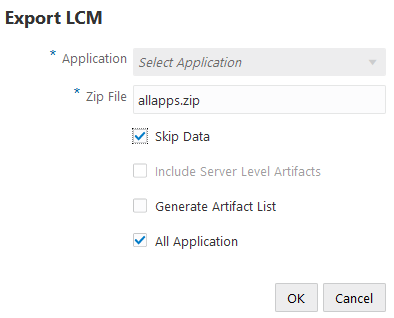Export LCM
The Export LCM job in the Essbase web interface enables you to back up Essbase cube artifacts to a Lifecycle Management (LCM) .zip file. To run this job, you must have at least Application Manager permission, or you must be the power user who created the application.

To back up cube artifacts to a .zip file,
-
On the Home page, click Jobs.
-
From the New Job menu, select Export LCM.
-
Select an application in the Application selector, OR, click All Application to export all applications to the zip.
-
Enter a name for the .zip file. If no location is specified, it is saved in
<Application Directory>/catalog/users/<user_name>. -
Optionally, select any of the following backup-related actions:
- Skip Data - Excludes data from the backup.
- Include Server Level Artifacts - Include globally defined connections and Datasources as part of the export.
- Generate Artifact List - Generate a text file containing a complete list of the exported artifacts. You can use this text file to manage the import of artifacts. For example, you can rearrange the order of artifacts in the list to control the order in which they are imported. You can skip importing some artifacts by removing or commenting out items in the list.
-
Click Submit.
Notes
By default, the ZIP file is stored on the Essbase Server file catalog, in the user directory of the user who exported it.
Lifecycle Management (LCM) import operations (and Migration Utility import) are not supported for migration of federated partitions. Federated partitions (applicable only for deployments on OCI) must be recreated manually on the target.
See also: LcmExport: Back Up Cube Files.